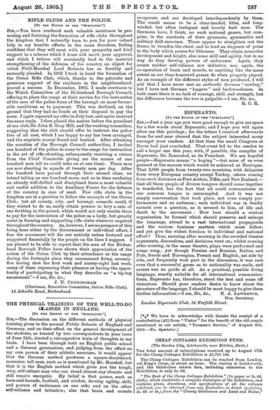Sin, — Just a year ago you were good enough to give
me space for a few words about Esperanto, and I hope you will again allow me this privilege ; for the letters I received afterwards from far and near showed that the subject interested many amongst your readers. At that time the small Congress at Dover had just concluded. That event led to the resolve to call a larger one this year, with, if possible, the compiler of Esperanto, Dr. Zamenhof, as its President. We ara hopeful people—Esperanto means "a hoping "—but none of us even guessed at the success which would be achieved at Boulogne. That 2,000 people from twenty-two countries, with delegates from every European country except Turkey, others coming from such distances as Port Arthur, Tiflis, and New Zealand,— that all these people of diverse tongues should come together is wonderful, but the fact that all could communicate in one• common tongue is unexampled. And it was not simply conversation that took place, not even simply per- formances and an audience ; each individual was in deadly earnest over a question, as it seemed to him, of life and death to the movement : How best should a central organisation be formed which should preserve and enlarge the language, attend to a vast international propaganda and the various business matters which must follow, and yet give the widest freedom to individual and national effort? Thus, morning after morning in the crowded theatre arguments, discussions, and decisions went on; whilst evening after evening, in the same theatre, plays were performed and songs sung; yet though Persian and Russian, Italian and Pole, Swede and Norwegian, French and English, sat side by side, and frequently took part in the discussion, it was rare even that a successful guess as to nationality was made, and accent was no guide at all. As a practical, possible living. language, exactly suitable for all international communica- tions, Esperanto has, therefore, stood the test and come off victorious. Should your readers desire to know about the structure of the language, I should be most happy to give them
further information.—I am, Sir, &c., E. A. LAMBENCE, Hon. Secretary.
London Esperanto Club, 14 Norfolk Street.
[*** We have to acknowledge with thanks the receipt of a contribution (42) from " Viator " for the benefit of the old couple mentioned in our article, "Yeoman's Service," of August 6th, 1904.—En. Spectator.]


































 Previous page
Previous page